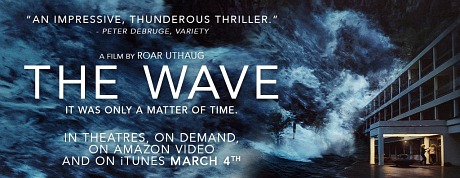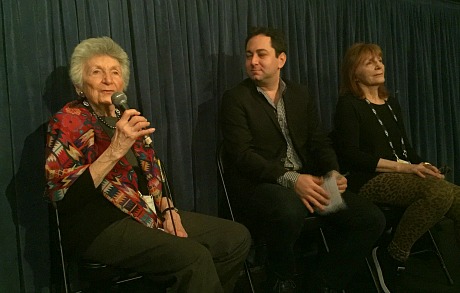I posted this conclusion-of-Patton video earlier today with another item, but this, no lie, is one of the best movie endings ever written (hat tip to Francis Coppola, who won an Oscar for the Patton screenplay). “All glory is fleeting” strikes exactly the right note about Gen. George S. Patton‘s life, of course — a life of a man who revelled in military glory, valor and proud tradition — but also about life itself. The good stuff is always fleeting, nothing wonderful ever lasts, it’s all disintegrating before our eyes. Joy is fleeting, you can only laugh at a great joke once, great love affairs are fleeting, moments of inspiration last only a fraction of a second. Oh, and you’ll be dead one day.
Day: February 5, 2016
Wardrobe Fail
What’s wrong with the guy who did the Photoshopping on this? Excellent family portrait, perfect de-aged rendering of Adam Driver as an nine-year-old, Ford and Fisher are just right. And then he dresses them in early ’90s middle-class Omaha suburban sitcom clothes? For God’s sake, man! Wells to JJ Abrams: Do you otherwise approve?

Nicely-Finessed Script by Nebraska Scribe, Patton Oswalt, Robert Forster as Another Grandpa…This Looks Good
To go by the trailer, Bob Nelson‘s The Confirmation doesn’t seem half bad. But why is it playing at the Berlin Film Festival market rather than as a regular festival selection? And if Saban Entertainment is going to post a critical blurb on the one-sheet, shouldn’t they go with the opinion of an occasionally tough critic rather than a guy who knows the industry backwards and forwards but tends to be, shall we say, a bit generous in his assessments? There’s nothing wrong with loving movies and having a big heart, but if they’d gotten an advance blurb from some buckaroo who doesn’t give a damn and is beholden to no one, it would be more persuasive.
Inarritu’s Pain Poem Tops $300 Million Worldwide
“Alejandro G. Iñárritu‘s The Revenant, now in its sixth week of wide release, passed the $300 million milestone Friday with a new global tally of $302 million. Its domestic total is $142.7 million.” — from a 2.5 Hollywood Reporter box-office story by Pamela McClintock and Rebecca Ford.
Impermanence
In a Vanity Fair profile of director-actress Elizabeth Banks, who should have been Oscar-nominated for her supporting performance in Love & Mercy, Banks is candid about stuff. “I know what I do well,” she tells Laura Jacobs. “If you look at what I’ve made, it’s all of a piece. It’s all funny and it all has a sense of play. If you saw ‘Just a Little Heart Attack’ and Pitch Perfect 2, it’s ‘Yeah, I see how the same person made those things. There’s a sense of light in them…they’re bright.” Banks adds that 2015 “was a great year. I don’t deny it. But I feel still that this could be fleeting.” Oh, it’s fleeting, all right! (Banks will be in Santa Barbara on Saturday for the Virtuosos Award ceremony.)
Above-Average Disaster Thriller, Too Much Emotion, Irritating Hero
Early this morning I finally saw Roar Uthaug‘s The Wave (Magnolia, 3.4), a $6.5 million Norweigan disaster film that’s easily as good as any similar-type American pic. Set in the real-life village of Geiranger, it’s about a married geologist dad named Kristian (Kristoffer Joner), trying to warn authorities about a possible tsunami (caused by a landslide into an adjacent fjord) that will drown the town. Every man, woman, dog and cat who hasn’t gotten the hell out will meet their maker.
Nobody listens, of course. In fact Kristian’s soon-to-be-former geological colleagues (he’s taken a better-paying job with an oil company) roll their eyes and give each other sullen looks. You know those looks, right? And the penalty for them? Any character in a disaster film who ignores scientific warnings and in fact embraces a blase attitude must suffer a horrible death when the bad thing finally happens. He/she must pay through the nose and whine like a dog and die badly.

When the landslide alarm sounds at the 45-minute mark, the locals and tourists have ten minutes (i.e, 600 seconds) to make it to high ground. Several drownings are assured. Kristian gets his young daughter (Edith Haagenrud-Sande) to safety but his wife (Ane Dahl Torp) and teenaged son (Jonas Hoff Oftebro) are stuck inside a four-story hotel when the wave hits, and urgently need rescuing.
The story is somewhat reminiscent of Irwin Allen‘s The Towering Inferno. Kristian is a bit like Paul Newman‘s architect, a smart guy trying to warn everyone, and then nobly struggling to save lives after disaster strikes.
I had three problems with Uthaug’s film, and I’m afraid they’re quite severe.
Problem #1 is that Kristian is too raggedy looking (he’s one of those guys who can’t pull off the two-week beardo look — he needs a shave). He’s not cool and focused like Newman, but acts like someone who needs to take Klonopin. When he’s ranting about the coming tsunami he’s like a character out of Nurse Ratched’s psycho ward. And he’s always got this stupid look on his face that says “oh my dear God, I’m so scared and upset but at the same time I have to do something to save my children and my fellow villagers!!” Wells to Joner: Will you go fuck yourself, please? Just grim up, be a man and do the brave, studly stuff. Spare us your tearful looks and your damn drippy emotions.
It Took Intellect To Master Her Art
After catching an 8:30 am screening of Roar Uthaug‘s The Wave inside Santa Barbara’s Metroplex I ran into Hollywood Reporter columnist Scott Feinberg and producer Marcia Nasatir, whom I’ve spoken to at parties over the last decade. Feinberg suggested I might want to attend a discussion he was soon to moderate about A Classy Broad, a documentary about Nasatir from director/editor Anne Goursaud. That sounded interesting so I ran into a nearby theatre and caught the last 15 minutes of it.

During this mornings’ q & a following screening of Anne Goursaud’s A Classy Broad: (l. to r.) Marcia Nasatir, Hollywood Reporter columnist Scott Feinberg, director Anne Goursaud.
Goursaud’s doc is obviously an admiring, up-close portrait of a brilliant and tenacious producer who had a tougher row to hoe than today’s female producers, coming up as she did in an era that was even more of a patriarchial system. By the mid ’70s Nasatir had worked her way up to a United Artists exec vp position under Mike Medavoy. She did some heavy lifting on such ’70s classics as Three Days of the Condor, One Flew Over The Cuckoo’s Nest, Carrie, Rocky, Coming Home, Apocalypse Now. As an independent producer Nasatir got The Big Chill made; ditto Ironweed, Hamburger Hill, Mrs. Cage and Death-Defying Acts.
Depp Does It His Way
Last night the Santa Barbara Film Festival threw a live Johnny Depp show at the Arlington. As dismissive and snarly as I felt at the very beginning over his tardiness (Depp’s limo pulled up at 8:20 pm — a good 50 minutes later than usual), I felt more and more charmed by the 53 year-old superstar during his interview with Leonard Maltin. He’s not a big star for nothing — he knows how to “get” people, and Hollywood Elsewhere, sitting front-row right and tweeting like a motherfucker, was no exception.
Depp spoke in front of the huge Arlington crowd like he was sitting at a kitchen table at 2:30 am, maybe a little hung-over and too tired to put on airs. He was Mr. Be-Bop-A-Luah all the way through, shaking his head and going “whoa, heh-heh…I’m not too good at this,” channelling the ghosts of Hunter S. Thompson and Marlon Brando, a gently playful prankster, more into toying with Maltin than submitting to his questions and sometimes even putting a slice or two of his actual self on the plate, mate.
Depp was there to accept the festival’s Modern Master Award — the first of a cavalcade of Oscar worthies who will make gala appearances and submit to interviews in this seaside town over the next nine days.
Clearly not at ease with the format and yet thoroughly confessional at every turn, Depp rambled and muttered and smirked his way through most of the 110-minute interview. Depp is a subversive. He cannot and will not play the humble-brag game. You can sense that he regards himself as some kind of King Shit cultural figure, but he’s too Deppian, too committed to (or consumed by) his rich-as-fuck attitude-rebel personality to swagger around with any kind of “ladies and gentleman, here I am!” conviction. He can’t help but smirk, shrug his shoulders, mumble, chuckle and riff like a jazzman in the back room.
You could argue that Depp was a good sport for showing up at all, as the initial expectation was that he’d land a Best Actor nomination for his husky-eyed performance as Boston gangster Whitey Bulger in Scott Cooper‘s Black Mass. The Academy didn’t oblige (if you ask me Depp should have been nominated instead of The Danish Girl‘s Eddie Redmayne) but he came anyway, late as fuck and therefore obliged to blow off the usual red-carpet interviews and autograph-signings with the fans, who had begun to gather in force around 6:30 pm or so.
